
Melastomataceae is a family of dicotyledonous flowering plants found mostly in the tropics comprising c. 175 genera and c. 5115 known species. Melastomes are annual or perennial herbs, shrubs, or small trees.

Chrysobalanaceae is a family of flowering plants, consisting of trees and shrubs in 27 genera and about 700 species of pantropical distribution with a centre of diversity in the Amazon. Some of the species contain silica in their bodies for rigidity and so the mesophyll often has sclerenchymatous idioblasts. The widespread species Chrysobalanus icaco produces a plum-like fruit and the plant is commonly known as the coco plum.

Trigoniaceae is a family of flowering plants, consisting of 28 species in five genera. It is a tropical family found in Madagascar, Southeast Asia, Central and South America.
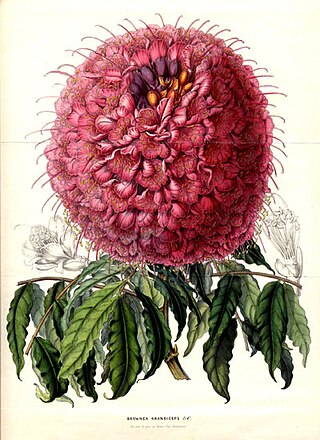
The subfamily Detarioideae is one of the subdivisions of the plant family Fabaceae (legumes). This subfamily includes many tropical trees, some of which are used for timber or have ecological importance. The subfamily consists of 84 genera, most of which are native to Africa and Asia. Pride of Burma and tamarind are two of the most notable species in Detarioideae. It has the following clade-based definition:
The most inclusive crown clade containing Goniorrhachis marginataTaub. and Aphanocalyx cynometroidesOliv., but not Cercis canadensisL., Duparquetia orchidaceaBaill., or Bobgunnia fistuloides(Harms) J. H. Kirkbr. & Wiersema.

Macrolobium is a legume genus in the subfamily Detarioideae. It is a tropical genus with about 80 species. Half occur in Brazil, where they are common in the floodplains of the Amazonian Basin. Members of the genus are used as ornamentals and for their wood.

Stryphnodendron is a genus of flowering plant in the legume family, Fabaceae. It includes 28 species of trees and suffrutices native to the tropical Americas, ranging from Nicaragua to Bolivia, Paraguay, and southern Brazil. Typical habitats include tropical rain forest and riparian forest, seasonally dry forest, cerrado, and caatinga. It belongs to the mimosoid clade of the subfamily Caesalpinioideae.

Swartzia is a genus of flowering plants in the family Fabaceae. It was named in honor of Swedish botanist Olof Swartz and contains about 200 species. Swartzia is restricted in its geographical distribution to the New World Tropics, where it occurs primarily in lowland rainforests, but also in savannas, pre-montane forests, and tropical dry forests. While it can be found throughout the wet lowlands from Mexico and the Caribbean islands to southern Brazil and Bolivia, Swartzia is most abundant and species-rich in Amazonia, where 10–20 species may co-occur at a single site. The species of Swartzia are mostly trees, ranging from small understory treelets to large canopy emergents. Some species, especially in savannas, are mult-stemmed shrubs.
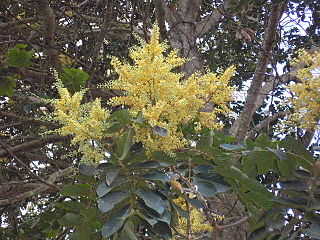
Tachigali is a flowering plant genus in the legume family (Fabaceae). It includes 74 species of trees native to the tropical Americas, ranging from Nicaragua to Bolivia, Paraguay, and southern Brazil. Typical habitats include tropical rain forest, lower montane forest, seasonally-flooded and non-flooded evergreen lowland forest and woodland, gallery and riparian forest, sometimes on white sands, cerrado and other dry woodland, and rocky grassland.

Amyris is a genus of flowering plants in the citrus family, Rutaceae. The generic name is derived from the Greek word αμυρων, which means "intensely scented" and refers to the strong odor of the resin. Members of the genus are commonly known as torchwoods because of their highly flammable wood.
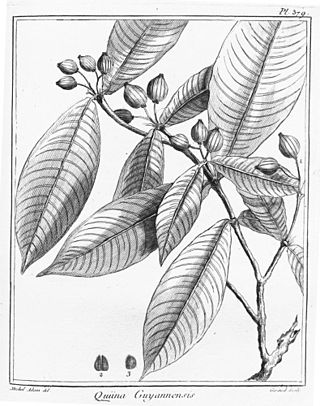
Quiina is a genus of plant in family Ochnaceae. It contains the following species :
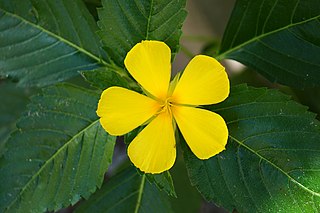
Turnera is a genus of flowering plants in the passionflower family, Passifloraceae. It contains more than 100 species native to tropical and subtropical America. The name honours English naturalist William Turner (1508–1568). It was previously placed in the family Turneraceae.
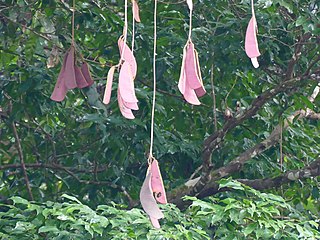
Eperua is a genus of flowering plants in the legume family, Fabaceae. It belongs to subfamily Detarioideae. It includes 16 species native to northern South America, in Colombia, Venezuela, the Guianas, and northern Brazil. They live in the jungles, often along rivers or streams. The leaves are compound pinnate, with smooth margins, and the fruits are long pods. The wood of E. falcata is called wallaba and is often used in construction.

Dicymbe is a genus of 20 species of canopy trees in the family Fabaceae, within subfamily Detarioideae. It is found throughout the Guyana Shield region and parts of W Amazonia. Certain species within the genus are strongly associated with ectomycorrhizal fungi.
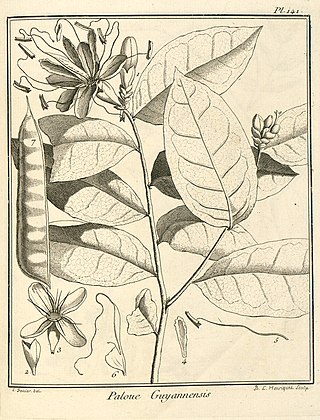
Paloue is a genus of flowering plants in the family Fabaceae. It belongs to the subfamily Detarioideae. The genera was first created with the description of Paloue guianensis by Aublet in 1775.
Ticorea is a genus of flowering plants belonging to the family Rutaceae.
Neoraputia is a genus of flowering plants belonging to the family Rutaceae.
Sipanea is a genus of flowering plants belonging to the family Rubiaceae.
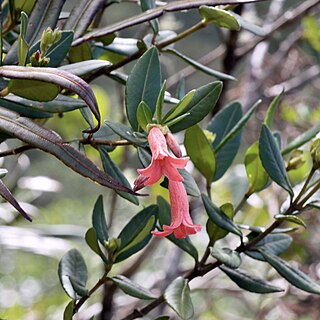
Raveniopsis is a genus of flowering plants belonging to the family Rutaceae.

Zanthoxyloideae is a subfamily of the family Rutaceae.















